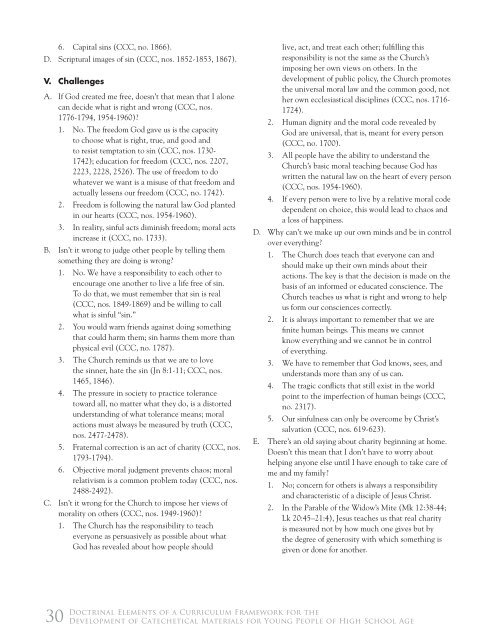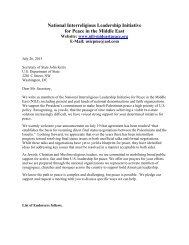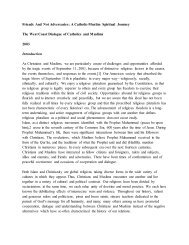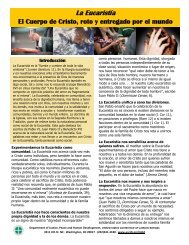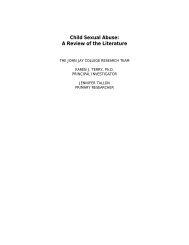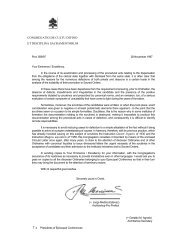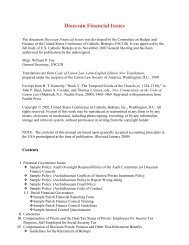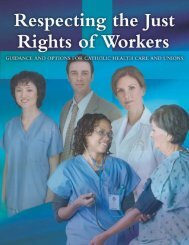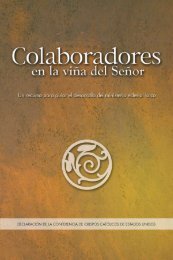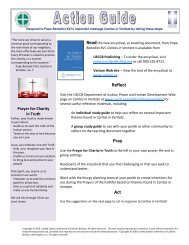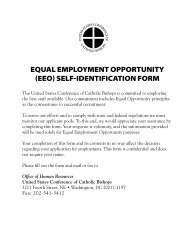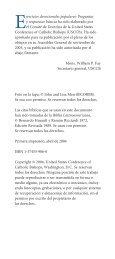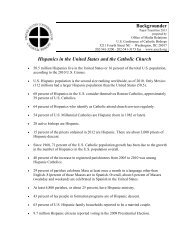Doctrinal Elements of a Curriculum Framework for the Development ...
Doctrinal Elements of a Curriculum Framework for the Development ...
Doctrinal Elements of a Curriculum Framework for the Development ...
- No tags were found...
Create successful ePaper yourself
Turn your PDF publications into a flip-book with our unique Google optimized e-Paper software.
6. Capital sins (CCC, no. 1866).D. Scriptural images <strong>of</strong> sin (CCC, nos. 1852-1853, 1867).V. ChallengesA. If God created me free, doesn’t that mean that I alonecan decide what is right and wrong (CCC, nos.1776-1794, 1954-1960)?1. No. The freedom God gave us is <strong>the</strong> capacityto choose what is right, true, and good andto resist temptation to sin (CCC, nos. 1730-1742); education <strong>for</strong> freedom (CCC, nos. 2207,2223, 2228, 2526). The use <strong>of</strong> freedom to dowhatever we want is a misuse <strong>of</strong> that freedom andactually lessens our freedom (CCC, no. 1742).2. Freedom is following <strong>the</strong> natural law God plantedin our hearts (CCC, nos. 1954-1960).3. In reality, sinful acts diminish freedom; moral actsincrease it (CCC, no. 1733).B. Isn’t it wrong to judge o<strong>the</strong>r people by telling <strong>the</strong>msomething <strong>the</strong>y are doing is wrong?1. No. We have a responsibility to each o<strong>the</strong>r toencourage one ano<strong>the</strong>r to live a life free <strong>of</strong> sin.To do that, we must remember that sin is real(CCC, nos. 1849-1869) and be willing to callwhat is sinful “sin.”2. You would warn friends against doing somethingthat could harm <strong>the</strong>m; sin harms <strong>the</strong>m more thanphysical evil (CCC, no. 1787).3. The Church reminds us that we are to love<strong>the</strong> sinner, hate <strong>the</strong> sin (Jn 8:1-11; CCC, nos.1465, 1846).4. The pressure in society to practice tolerancetoward all, no matter what <strong>the</strong>y do, is a distortedunderstanding <strong>of</strong> what tolerance means; moralactions must always be measured by truth (CCC,nos. 2477-2478).5. Fraternal correction is an act <strong>of</strong> charity (CCC, nos.1793-1794).6. Objective moral judgment prevents chaos; moralrelativism is a common problem today (CCC, nos.2488-2492).C. Isn’t it wrong <strong>for</strong> <strong>the</strong> Church to impose her views <strong>of</strong>morality on o<strong>the</strong>rs (CCC, nos. 1949-1960)?1. The Church has <strong>the</strong> responsibility to teacheveryone as persuasively as possible about whatGod has revealed about how people shouldlive, act, and treat each o<strong>the</strong>r; fulfilling thisresponsibility is not <strong>the</strong> same as <strong>the</strong> Church’simposing her own views on o<strong>the</strong>rs. In <strong>the</strong>development <strong>of</strong> public policy, <strong>the</strong> Church promotes<strong>the</strong> universal moral law and <strong>the</strong> common good, no<strong>the</strong>r own ecclesiastical disciplines (CCC, nos. 1716-1724).2. Human dignity and <strong>the</strong> moral code revealed byGod are universal, that is, meant <strong>for</strong> every person(CCC, no. 1700).3. All people have <strong>the</strong> ability to understand <strong>the</strong>Church’s basic moral teaching because God haswritten <strong>the</strong> natural law on <strong>the</strong> heart <strong>of</strong> every person(CCC, nos. 1954-1960).4. If every person were to live by a relative moral codedependent on choice, this would lead to chaos anda loss <strong>of</strong> happiness.D. Why can’t we make up our own minds and be in controlover everything?1. The Church does teach that everyone can andshould make up <strong>the</strong>ir own minds about <strong>the</strong>iractions. The key is that <strong>the</strong> decision is made on <strong>the</strong>basis <strong>of</strong> an in<strong>for</strong>med or educated conscience. TheChurch teaches us what is right and wrong to helpus <strong>for</strong>m our consciences correctly.2. It is always important to remember that we arefinite human beings. This means we cannotknow everything and we cannot be in control<strong>of</strong> everything.3. We have to remember that God knows, sees, andunderstands more than any <strong>of</strong> us can.4. The tragic conflicts that still exist in <strong>the</strong> worldpoint to <strong>the</strong> imperfection <strong>of</strong> human beings (CCC,no. 2317).5. Our sinfulness can only be overcome by Christ’ssalvation (CCC, nos. 619-623).E. There’s an old saying about charity beginning at home.Doesn’t this mean that I don’t have to worry abou<strong>the</strong>lping anyone else until I have enough to take care <strong>of</strong>me and my family?1. No; concern <strong>for</strong> o<strong>the</strong>rs is always a responsibilityand characteristic <strong>of</strong> a disciple <strong>of</strong> Jesus Christ.2. In <strong>the</strong> Parable <strong>of</strong> <strong>the</strong> Widow’s Mite (Mk 12:38-44;Lk 20:45–21:4), Jesus teaches us that real charityis measured not by how much one gives but by<strong>the</strong> degree <strong>of</strong> generosity with which something isgiven or done <strong>for</strong> ano<strong>the</strong>r.30<strong>Doctrinal</strong> <strong>Elements</strong> <strong>of</strong> a <strong>Curriculum</strong> <strong>Framework</strong> <strong>for</strong> <strong>the</strong><strong>Development</strong> <strong>of</strong> Catechetical Materials <strong>for</strong> Young People <strong>of</strong> High School Age


